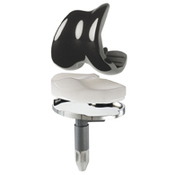Knee Replacement for Painful Knee Arthritis – Which Implant To Use?
Knee arthritis can be very painful and debilitating.
The typical complaints of the patient include:
- pain in the knee on walking or standing
- early morning stiffness or stiffness after a period of inactivity
- puffiness and deformity of the knee
- inability to squat
- unable to fully straighten or fully bend the knee
- coarse sounds coming from the knee when moving it
The common causes of knee arthritis include:
- osteoarthritis – from wear and tear
- inflammatory arthritis e.g. rheumatoid arthritis
- post-traumatic arthritis e.g. after fractures around the knee involving the cartilage surface
- post-menisectomy syndrome – osteoarthritis of the knee developing due to previous loss of meniscus cartilage
Total knee replacement is a procedure that can help patients with knee arthritis pain.
This surgery involves surgically removing the arthritic portion of the knee joint and replacing the knee with metal prosthesis in the distal thigh bone and proximal shin bone and inserting a plastic spacer between the 2 metallic components.
A successful total knee replacement will remove most if not all of the arthritis pain, allow the patient to regain independant walking status without disability.
Wear in Total Knee Replacements
Wear of plastic/polyethylene components has often been reported in total knee replacements to be a primary cause of complications and failure. Retrieval analyses and published articles support that a high percentage of inserts and patellas develop a significant wear pattern clinically.
Typically such knee replacement components can last about 10 to 15 years before the patient experience failure of the component usually from implant loosening and osteolysis (the bone next to the implants become eaten up by inflammatory cells as a result of plastic wear particles).
In eight total knee replacement retrieval studies covering the last 20 years, plastic/ polyethylene wear was identified in over 50% of the 3,300-plus knees examined.
More than 10 publications in the past 10 years have linked plastic/polyethylene wear to complications and failure of total knee replacements.
The key to longevity of the implants include good implant alignment during surgery, reduce amount of plastic wear particles generated by the metal component sliding over the plastic spacer.
The usual metal component of the distal thigh (femur) is cobalt chrome. It glided over the plastic spacer and this generated a standard amount of microscopic plastic wear particles. Such wear particles were found to be the cause of loosening of the metal implant on the bone after 10 to 15 years of use.
A good option that is available to my patients at this point in time is the use of knee replacement prosthesis with oxinium coating.
Oxinium is oxidised zirconium.
Hardness, lubricity and abrasion resistance are all improved. Knee simulator wear testing of oxinium material showed an 85 percent decrease in plastic/polyethylene wear compared to cobalt chrome.
Because of its superior hardness, smoothness and resistance to scratching and abrasion, you can expect an oxinium joint replacement to be longer -lasting, which should allow you to resume normal activities with less fear of undergoing repeat revision surgery.
I typically offer this implant to my patients who are younger or more active. It gives them the best chance to have a longer lasting knee replacement with less risk of future revision surgery from implant loosening.
What is the OXINIUM material?
OXINIUM◊ oxidized zirconium is a metallic alloy with a ceramic surface that provides wear resistance without brittleness.
OXINIUM◊ material combines the best of both metal and ceramics.
It is a metal, with excellent fracture toughness like cobalt chrome, but it has a ceramic surface that offers outstanding wear resistance.
The ceramic is an enhanced surface that is part of the metal substrate rather than an external coating, making it very durable.
Zirconium: a biocompatible metallic element in the same family as titanium.
Zirconia: a ceramic compound, wear-resistant but brittle.
Zr-2.5Nb: a metallic alloy of zirconium, with niobium and oxygen for increased strength.
Dr HC Chang performs total knee replacement surgeries and uses Oxinium implants. Contact us at 683 666 36 or email hcchang@ortho.com.sg for an appointment.
Visit http://www.ortho.com.sg


